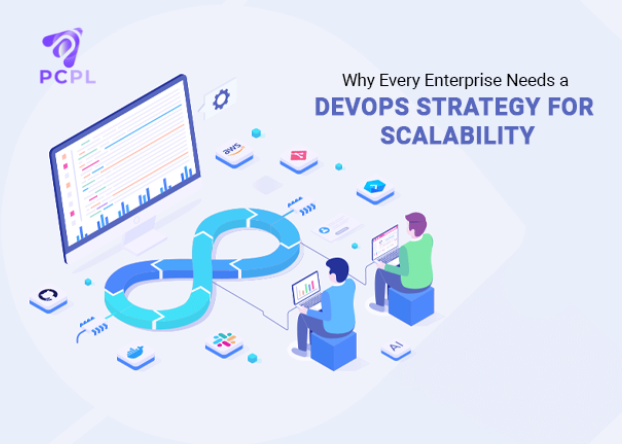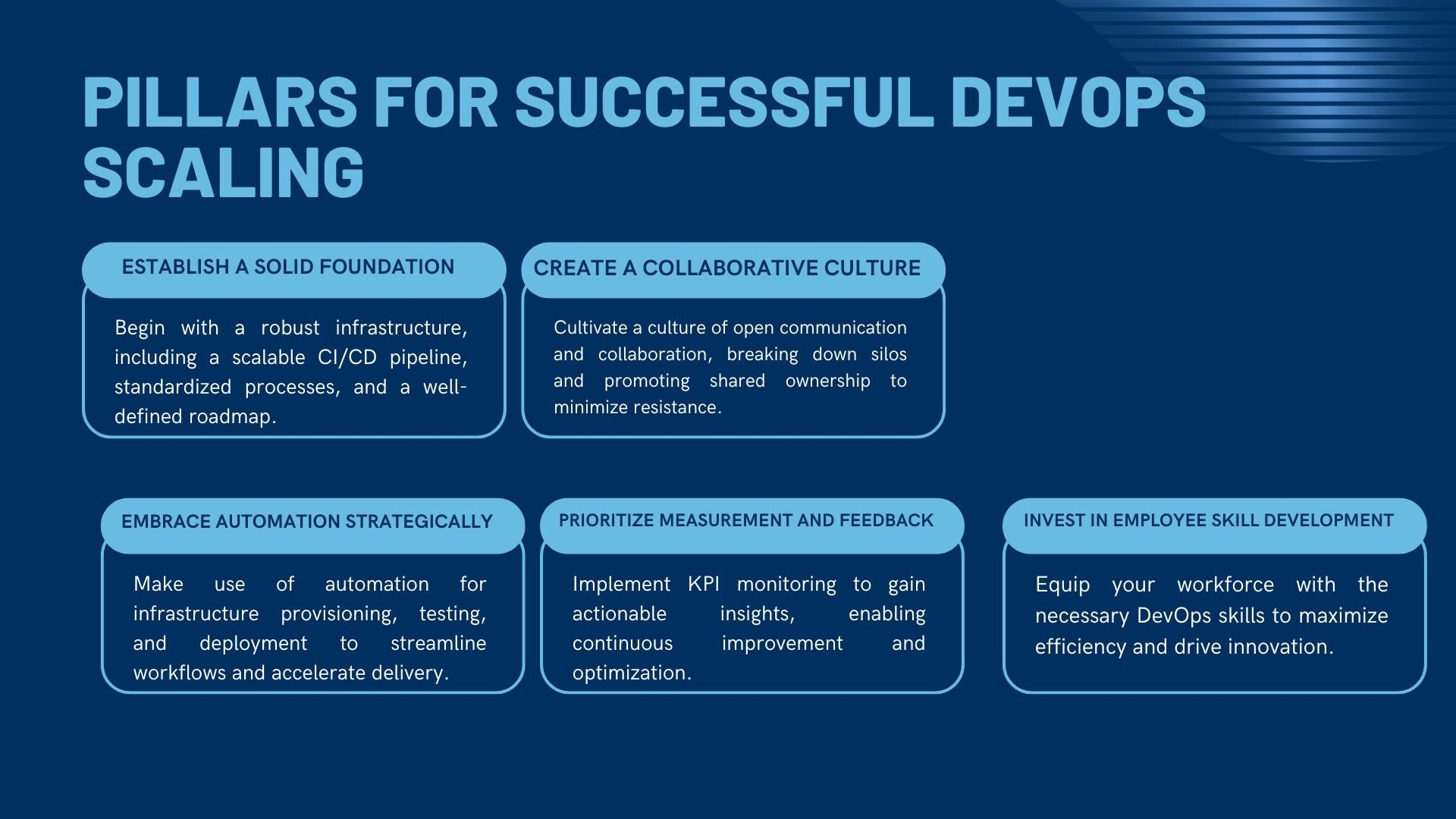
Why Every Enterprise Needs a DevOps Strategy for Scalability
To maintain competitive agility and robust cybersecurity in this rapidly evolving digital world, enterprises must aggressively embrace a DevOps-driven approach. The accelerated pace of application and platform innovation calls for a streamlined development and deployment cycle.
DevOps’ proven ability to synergize software development and IT operations continues to yield significant advantages, enabling faster, higher-quality application delivery.
Urgency and Impact of Real-Time DevOps
Organizations face unprecedented pressure to accelerate time-to-market while simultaneously defending against real-time cyber threats. The essential need for immediate responses to both market opportunities and security vulnerabilities, particularly those targeting core cybersecurity infrastructure, is important.
Competitive advantage now relies on the ability to rapidly capitalize on emerging customer needs. In volatile markets, delays in delivering customer-centric applications are unacceptable.
DevOps, when fully integrated into an organization’s DNA, provides the necessary agility and speed. Consider a typical large enterprise managing over 200 concurrent projects, with a significant majority focused on enhancing customer experiences and bolstering security. This shows the indispensable role of DevOps in enabling real-time responsiveness and securing a competitive edge.
Strategic Importance and Challenges of Scaling DevOps
Companies who fail to embrace DevOps practices lose a competitive edge. The anticipated convergence of DevOps, DataOps, and database workflows in modernizing data pipelines underscores the important need for scalable solutions.
Contemporary businesses deal with a complex environment marked by fluctuating demands, escalating complexities, and fierce competition. Scaling DevOps represents a strategic imperative. Organizations can effectively address these challenges by centralizing and standardizing processes, and by amplifying automation and collaboration. This strategic move not only optimizes operational efficiency and reduces costs but also accelerates delivery cycles and elevates software quality, ultimately driving heightened customer satisfaction and creating sustainable growth.
Building a Strong Business Case for DevOps
The need for DevOps rests on its proven ability to enable real-time responsiveness to market opportunities and security threats. This agility translates directly into a competitive advantage. The engine driving successful DevOps adoption is the unwavering commitment of Development and IT Operations to collaborative excellence. This synergy creates the rapid delivery of high-quality applications and customer-facing tools.
To solidify this business case, leaders must prioritize the cultivation of a truly collaborative environment. Joint ownership and shared accountability are important, leading to accelerated development cycles and superior code quality. Effective DevOps leadership is characterized by a relentless focus on removing obstacles, ensuring teams can operate seamlessly and deliver exceptional results. This proactive approach reinforces the tangible value of DevOps and strengthens its strategic importance within the enterprise.
Overcoming the Hurdles of DevOps Scaling
Scaling DevOps within large enterprises comes with its own set of challenges. However, with proactive planning and strategic implementation, these obstacles can be effectively mitigated.

- Resistance to Process Change
Existing teams may resist new processes due to ingrained habits or fear of disruption. Therefore, it is essential to create a culture of transparency by clearly communicating the benefits of DevOps scaling. Encourage active employee participation and provide comprehensive training and ongoing support. Emphasize continuous learning as a core organizational value, promoting adaptability.
- Complexity of Scaling
The intricate nature of DevOps scaling, involving multiple interconnected processes and technologies, can be overwhelming. Break down complex tasks into manageable modules. Make use of automation tools to streamline workflows and implement centralized monitoring solutions to maintain visibility and control.
- Robust Data Security
Handling sensitive data necessitates stringent security measures throughout the Software Development Lifecycle (SDLC). Integrate security best practices into every stage of the SDLC, from planning to production. Utilize Infrastructure as Code (IaC) templates to prevent misconfigurations and address vulnerabilities proactively.
- Budget and Resource Constraints
Allocating sufficient budget and resources for DevOps scaling can be a significant hurdle, even for established enterprises. Prioritize investments in DevOps tools and technologies based on demonstrable ROI. Explore cost-effective alternatives such as cloud computing and open-source solutions. Implement continuous monitoring and evaluation to optimize resource allocation and ensure sustained value.
Strategic Implementation for Success
Companies can unlock the transformative potential of DevOps scaling by proactively addressing these challenges. Partnering with a reputable enterprise DevOps services provider can further streamline the process. Implementing a well-defined scaling strategy is essential to achieving sustainable success and maximizing the benefits of this revolutionary approach
Business Value of DevOps
DevOps leaders strengthen their teams by focusing on a few critical factors, which also form the foundation for building a compelling business case for enterprises new to DevOps.

- Reduced Downtime and Operational Efficiency– DevOps dramatically minimizes costly downtime by improving IT operations’ scale, traceability, and visibility. Companies realize substantial savings and operational stability by reducing unplanned outages, which can cost millions.
- Accelerated Time-to-Market– Workflow orchestration within DevOps triples application and service cycle times, leading to faster market entry, lower costs, and enhanced customer satisfaction.
- Enhanced Code and Software Quality– Iterative development in DevOps facilitates early bug detection, reducing customer service costs, code patching, and application replacements. This results in higher-quality software and improved customer trust.
- Metrics-Driven ROI– DevOps’ financial contributions are quantifiable through a metrics-driven roadmap, focusing on optimizing staff, reducing expenses, and increasing sales, providing CFOs with clear ROI visibility.
- Improved Financial Reporting and Collaboration– Enhanced collaboration across departments, including Finance, Sales, and Executive Management, closes financial reporting gaps and prevents costly errors during application development.
- Proactive Risk Management– DevOps-driven tools provide real-time risk-based metrics and KPIs, enabling proactive identification and mitigation of revenue-threatening issues, saving sales and retaining customers.
- Enabling Smart, Connected Products- DevOps facilitates the development of next-generation smart, connected products, unlocking new subscription revenue streams and driving significant market growth.
- Promoting Innovation and Customer Experience– DevOps empowers teams to identify and capitalize on customer experience improvement opportunities, fueling new product ideas and organic revenue growth.
- Strengthening Security with Zero Trust- Integrating Zero Trust principles into every DevOps phase ensures robust security, protecting sensitive data and maintaining developer productivity.
- Driving Customer Loyalty and Digital Reinvention– DevOps frameworks enhance customer loyalty, increase lifetime customer value, and enable digital reinvention through AI and machine learning, driving data-driven business outcomes.
Strategies for Effective Enterprise DevOps Scaling
While each enterprise possesses unique requirements, a set of core strategies consistently drives successful DevOps scaling. Implementing these strategies will empower your organization to achieve optimal agility and efficiency.
- Establish a Robust Foundational Infrastructure
Build a scalable CI/CD pipeline leveraging advanced tools like Jenkins or Azure DevOps to centralize and streamline software delivery. Implement clear coding standards, rigorous security protocols, and standardized deployment processes across all teams. Define roles and responsibilities to ensure clarity and accountability. This ensures a stable and efficient foundation for rapid, reliable software delivery.
- Cultivate a Collaborative Culture
Build a culture of continuous collaboration and monitoring, breaking down silos between development and operations. Establish open communication channels, promote shared ownership, and build cross-functional teams with diverse expertise. This enhances communication, accelerates problem-solving, and drives overall efficiency in the DevOps process.
- Embrace Automation Across the Ecosystem
Implement Infrastructure as Code (IaC) using tools like Ansible and Terraform to minimize manual errors and ensure consistency. Automate build, test, and deployment activities through CI/CD pipelines to accelerate time-to-market. Integrate automated testing tools to maintain high software quality. This reduces human error, accelerates delivery cycles, and improves software quality through consistent, automated processes.
- Prioritize Measurement and Feedback Loops
Establish continuous tracking, measurement, and feedback mechanisms to identify areas for improvement. Monitor key performance indicators (KPIs) such as deployment frequency, lead time, and mean time to repair (MTTR). Solicit regular feedback from stakeholders to drive continuous improvement. This provides actionable insights for optimizing DevOps processes and ensuring alignment with business objectives.
- Invest in Skills Development and Training
Invest in comprehensive training programs to equip employees with essential skills in cloud computing, automation, and security. Ensure all teams possess the necessary expertise to leverage cloud platforms effectively. This empowers teams to maximize the benefits of DevOps scaling, enabling them to navigate challenges and drive innovation.
Pillars for Successful DevOps Scaling

Conclusion
Organizations have been grappling with an ever-expanding backlog of IT projects, a challenge exacerbated by the limitations of traditional, waterfall development methodologies. The sheer complexity and rapid pace of change demand a more agile approach. DevOps offers a great solution, providing a clear pathway to enhanced efficiency and responsiveness.
Further, these are proving invaluable in enabling established enterprises to seamlessly transition to new digital business models. These provide the necessary flexibility and adaptability to succeed and grow in a constantly evolving world, ensuring businesses can effectively deal with and capitalize on the opportunities presented by the digital age.
References
